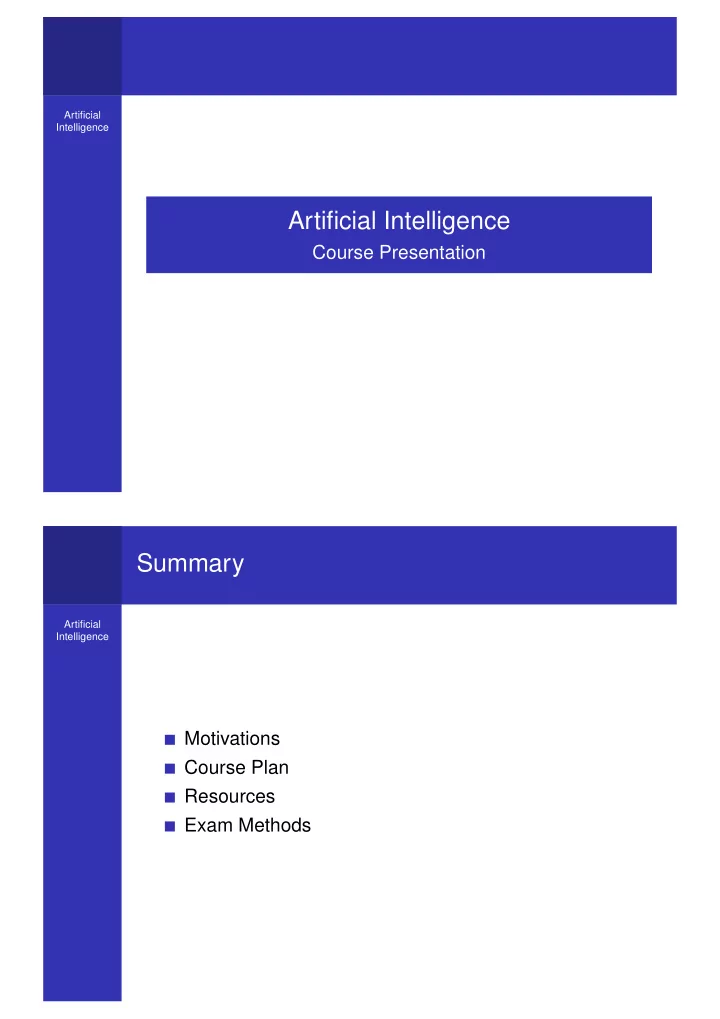

Artificial Intelligence Artificial Intelligence Course Presentation Summary Artificial Intelligence Motivations Course Plan Resources Exam Methods
Motivations Artificial Intelligence Artificial Intelligence: Machines that think and act like humans do Voight-Kampff test in blade-runner Motivations Artificial Artificial Intelligence: Intelligence Machines that solve complex problems Google Self Driving car
Related areas Artificial Intelligence AI highly interdisciplinary Probability and Statistics Robotics Logics Algorithms Game Theory Pattern Recognition and Machine Learning Practical applications: Overview Artificial Intelligence Surveillance Environmental monitoring Search and Rescue operations Energy management Service Robots Games, entertainment and education Computer Vision Medical Diagnosis Hardware/Software Verification ...
Service Robots/Entertainment: Cooperative Foraging Artificial Decide who is in the best position to execute a task Intelligence Surveillance and Monitoring: mobile sensor exploration Artificial A group of sensors cooperatively plans for most informative Intelligence paths
Surveillance and Monitoring: precisione agriculture Artificial Intelligence Analyse data from greenhouse sensor network to maximize crop yield and minimize infection (Post-doc: Alberto Castellini, Project: EXPO-AGRI) Surveillance and Monitoring: Multi-Robot Patrolling Artificial Intelligence Allocate visit locations to a group of robots
Security: Active Malware Analysis Use Reinforcememnt Learning to analyse malware Artificial Intelligence behaviors (PhD: Riccardo Sartea) Ride-Sharing: coalition formation Artificial Form groups of riders to minimize fuel consumption Intelligence (Post-Doc: Filippo Bistaffa)
Environmental Survey: Water Monitoring Artificial Intelligence Intelligent drones to monitor water quality Water Monitoring: High level control for the drones Artificial Intelligence Human interaction with team oriented plans (PhD student: Masoume Raeissi)
Water Monitoring: Planning informative paths Active learning to devise informative paths for classification Artificial Intelligence (PhD student: Lorenzo Bottarelli) Water Monitoring: perception for autonomous behaviors Artificial Intelligence Use computer vision to detect relevant features and situations (Researcher: Domenico Bloisi)
Course Plan I Artificial Intelligence Problem Solving: Search (about 4 Lessons) Uninformed search (Breadth first, Depth First, Iterative Deepening, etc.) Informed Search (A*, Heuristics, Local Search and Optimization) Constraint Processing (CSP , COP) (about 4 lessons) Contraint Satisfaction Problems, Constraint Network and Graphical models Basic techniques for CSP (Consistency enforcing, Backtracking, Local Search) Tree-Decomposition (Dynamic Programming) Constraint Optimisation Problems Course Plan II Artificial Multi-Agent Systems (about 2 lessons) Intelligence Distributed COPs Reaching agreement Prova parziale (approx. end of April) Adversarial Search (1 lesson) Plan representation and monitoring (1 lesson) Logic and Agents (about 2 lessons) Logical Agents Background on Logic (propositional, FOL) Inference (DPLL, Resolution) Probabilistic Reasoning (about 5 lessons) background on Probability Bayesian Network Inference (complete and approximate) Markov Decision Processes and Reinforcement Learning
Resources Artificial Intelligence Text Books Artificial Intelligence: a modern approach 2nd Editon Russel and Norvig (English edition) Constraint Processing R. Dechter Other Material Scientific Papers, Slides, etc. Will be available on web site Web Page link http://profs.sci.univr.it/ farinelli/courses/ia/ia.html Exam modalities Artificial Intelligence Single-test mode Single written test at the exam day Partial test mode: Two tests C1 + [C2 or P] C1 and C2: solve simple exercises/describe techniques studied during the course P: project to be developed at home (see below) only to the exams right at the end of the class (Summer Session) partial written test C1: half-way through the course C2: at the end of the course. project (P) can be done in collaboration with another person Final grade: 50%C + 50%[C1 or P]
Projects Artificial Intelligence Project Instructor will propose a set of projects Students can: choose among the set of proposed projects or propose other projects Projects proposed by students must be validated by the instructor Projects usually involve a programming part (in the language most appropriate for the project) Students must hand to the instructor a report of the project and developed code. Have a look at past projects on the course web site
Recommend
More recommend